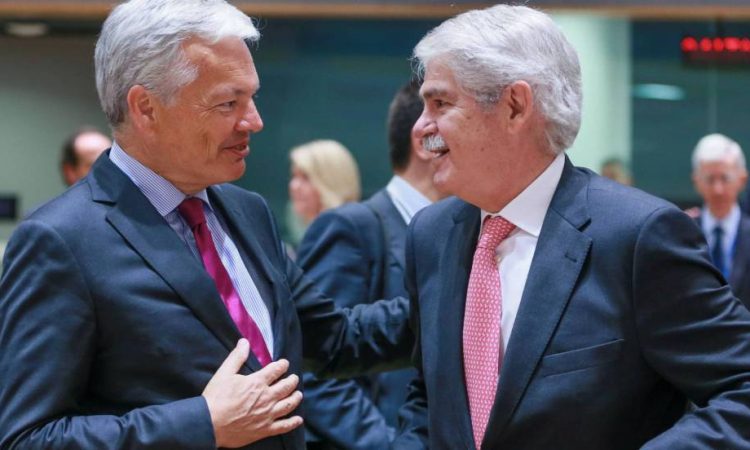
Brussels will add more names to the list of regime members vetoed in Europe
The European Union is ready to act “quickly” to impose more sanctions on Venezuela after the elections without guarantees that were held on May 20. The foreign ministers of the 28 EU countries have taken the decision on Monday in response to the “lack of credibility” of the consultation, which recorded a record abstention and was held in the absence of the bulk of the opposition.
With that political mandate to add restrictive measures “that do not harm the population of Venezuela”, according to the text approved by the ministers in the Foreign Council, the EU experts will now evaluate the new names that they will add to the list of people who are prohibited from entering the community territory and whose assets are seized. “We hope that the increase in pressure, also from countries in the Latin American region, will convince the regime that the only solution is dialogue,” said Spanish Minister Alfonso Dastis at a press conference.
Europe has applied sanctions against Venezuela since November 2017. After several warnings about the political and economic deterioration in the Latin American country, the 28 member countries unanimously agreed to an arms embargo. In January, they approved for the first time individual sanctions against seven senior officials of the Maduro government, including the regime’s number two, Diosdado Cabello. All of them are banned from entering the EU and confiscated any assets they keep in community territory.
The decision on Monday, driven by Spain, is to give political support to the expansion of that list, which will include senior officials considered responsible for the political and economic decline experienced by the South American country. The restrictive measures must be finally approved at the next Foreign Council, at the end of June.
With the obstacles to the opposition leaders and the “lack of respect for the minimum democratic standards”, the EU considers that the Venezuelan elections were not “neither free nor fair”. In this logic, the community block underlines “the need for free and transparent elections that respect the constitutional rules of Venezuela.” Abstention reached 68% of voters, according to unofficial estimates. The official count placed it at 54%.
Low intensity punishment
Despite rejecting the drift of Maduro, Europe is wary of trying any strategy that can economically harm a population already severely punished by the involution of the country. “That is why we have not adopted any measure related to the oil sector,” argues a senior official of the European diplomatic service. The United States did decide to restrict the purchase of Venezuelan debt by US citizens in response to electoral fraud.
Brussels has wanted to wait until the holding of the elections to exert more pressure on the Venezuelan regime through sanctions. Although the European Parliament asked in February to go further in this diplomatic punishment, seeing the deterioration of the political situation in Venezuela, Mogherini wanted to exhaust the dialogue with the government and opposition forces in the country.
The high representative met in early April with the Venezuelan Foreign Minister, Jorge Arreaza, to whom he explained that the European Union would not participate as an electoral observer in Venezuela because the process lacked the necessary guarantees. Later, he received the president of the National Assembly, Omar Barboza – a parliamentary institution ruled by the regime when he created the so-called Constituent Assembly last summer – and with representatives of the four main opposition parties.







